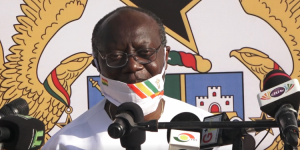The Managing Director of Vlisco Ghana, Fatoumata Doro, indicated that the brand is committed to investing the said amount in training, empowerment and business promotion of young talents in the fashion industry on the continent in line with the United Nation’s sustainable development goals (SDGs).
“We want, for the next five years, to invest €7.3million in various commitments in our environment, social and governance (ESG) programmes. This will be in different kinds of activities – some toward training and developing African tailors and designers, climate change, gender equality, and peace & justice, among others,” she said.
The MD emphasised that Vlisco is committed to helping in developing the African continent through elements that are linked to the SDGs as the brand wants to be part of the change and development story of the continent.
With Ghana’s fashion industry regarded to be quite young and full of growth potential, she indicated that it is one of the top three countries of the company’s operations, and would receive a significant chunk of the amount.
Additionally, the company is also investing a whooping €10million in production machinery and technology to grow the brand’s operations in the country, and create more sustainable employment opportunities for the youth and the next generation.
The MD stressed that with the GTP brand, a subsidiary of the mother company, an arrangement has been made with the Ghana Tailors Association (GTA) to train some 5,000 tailors for the next five years as well, and all of these are toward the greater good of building a robust fashion industry or hub in the sub-region.
“We have trained about 400 tailors so far, and have also empowered them to start their fashion careers; and we will continue to do so for the next five years. Some of them will also have the opportunity to be winning different prizes that will grow their business even more for the future,” she added.
According to the MD, all these efforts are targetted at building more resilient value chains through innovative business models.
E-commerce, artificial intelligence, augmented reality and digital printing are some of the fashion-enabling tools that will shape the future of the fashion industry in Africa and this requires some investment from both government and corporate entities to build a robust ecosystem for players to thrive in the space.
Founder of Young Educators Foundation, Eugenia Tachie-Menson, lauded Vlisco for the initiative, indicating that the fashion industry in Ghana is lacking when it comes to the business or marketing aspect, and so this initiative will go a long way to support that area and catapult the industry to greater heights.
“This is Africa’s time and the continent has one of the most budding groups of young people in the creative space, and so corporate institutions can support systems and players to unearth talents and support the entire eco-system,” she said.
The COVID-19 pandemic provided the opportunity and time to rethink, re-invent and re-develop the fashion industry, and this has also presented the opportunity for Africa’s fashion businesses to leap forward with the right support, Vlisco believes.







